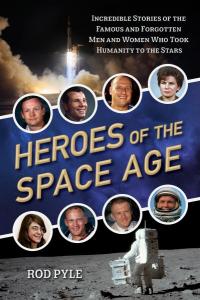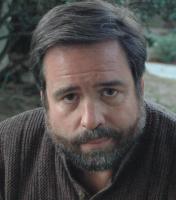
Rod Pyle: Heroes of the Space Age
For this column, NASW book editor Lynne Lamberg asks NASW authors to tell how they came up with the idea for their book, developed a proposal, found an agent and publisher, funded and conducted research, and put the book together. She also asks what they wish they had known before they began working on their book, what they might do differently the next time, and what tips they can offer aspiring authors. She then edits the A part of that Q&A to produce the author reports you see here.
Publication of NASW members’ reports in Advance Copy does not constitute NASW’s endorsement of their books. NASW welcomes your comments, and hopes this column stimulates productive discussions.
HEROES OF THE SPACE AGE:INCREDIBLE STORIES OF THE FAMOUS AND
FORGOTTEN MEN AND WOMEN
WHO TOOK HUMANITY TO THE STARS
Rod Pyle
Prometheus Books, May 7, 2019, $18.95
ISBN-10: 1633885240; ISBN-13: 978-1633885240
Pyle reports:
I proposed Heroes of the Space Age: Incredible Stories of the Famous and Forgotten Men and Women Who Took Humanity to the Stars concurrent with the other title I was writing for Prometheus books for 2019, Interplanetary Robots. Both titles were intended the be co-branded with 2017’s Amazing Stories of the Space Age, but the publisher decided that they should be stand-alone products. It was a two-title deal, a first for both me and Prometheus.
Heroes of the Space Age is exactly what the title conveys—seven one-chapter biographies of major figures of the space age. The publisher added the subtitle as a marketing hook. While the subtitle is essentially accurate, only a couple of names in the book would qualify as potentially “forgotten.”
The main challenge in completing the book was a tight researching and writing schedule—I had two other books to write that year and one more to finish—but it was a challenge I could not resist. Fortunately, there is a lot of material on most of the people I chose for the book in official biographies, autobiographies and official oral histories.The exceptions were the Soviets included in the book. While there was a fair amount of source material on Yuri Gagarin, there was almost none readily available on Valentina Tereshkova, so that chapter required much more research. As always with such histories, one must dig deep to vet facts from historical accounts. Things were moving quickly in the space race and not everything was well-documented.
With the text completed, I pulled photos from a variety of sources. Most NASA material is in the public domain. There was some initial concern over rights for the Soviet-era images, but since there was no copyright agreement between the US and the USSR in the 1960s and '70s, the publisher accepted the images with clear lineage to the Soviet government.
Contact info:
- Rod Pyle, 626-399-4440, rodpyle@yahoo.com; https://www.pylebooks.com/, @chryseplanatia
- Agent: John Willig, 609-698-7162, jwiltagent@msn.com
- Publicist: Lisa Michalski, 716-691-0133, lmichalski@prometheusbooks.com
NASW members: will your book be published soon? Take advantage of this opportunity for shameless self-promotion. Submit your report for Advance Copy.
Tell your fellow NASW members how you came up with the idea for your book, developed a proposal, found an agent and publisher, funded and conducted research, and put the book together. Include what you wish you had known before you began working on your book, or had done differently.
See https://www.nasw.org/advance-copy-submission-guidelines.
View Advance Copy archives at https://www.nasw.org/member-article/advance-copy.
Thinking of writing a book? If you are a NASW member, you may access a list of more than 150 books and online resources to help you craft your book proposal, find an agent and funding sources, negotiate your contract, learn about self-publishing, publicize and market your book, and more at https://www.nasw.org/article/write-book.
Send book info and questions about book publishing to Lynne Lamberg, NASW book editor, llamberg@nasw.org.
Image: Manchester Central Library in the UK by Timajo from Pixabay.
Advance Copy
The path from idea to book may take myriad routes. The Advance Copy column, started in 2000 by NASW volunteer book editor Lynne Lamberg, features NASW authors telling the stories behind their books. Authors are asked to report how they got their idea, honed it into a proposal, found an agent and a publisher, funded and conducted their research, and organized their writing process. They also are asked to share what they wish they’d known when they started or would do differently next time, and what advice they can offer aspiring authors. Lamberg edits the authors’ answers to produce the Advance Copy reports.
NASW members: Will your book be published soon? Visit www.nasw.org/advance-copy-submission-guidelines for information on submitting your report.
Publication of NASW author reports in Advance Copy does not constitute NASW's endorsement of any publication or the ideas, values, or material contained within or espoused by authors or their books. We hope this column stimulates productive discussions on important topics now and in the future as both science and societies progress. We welcome your discussion in the comments section below.


